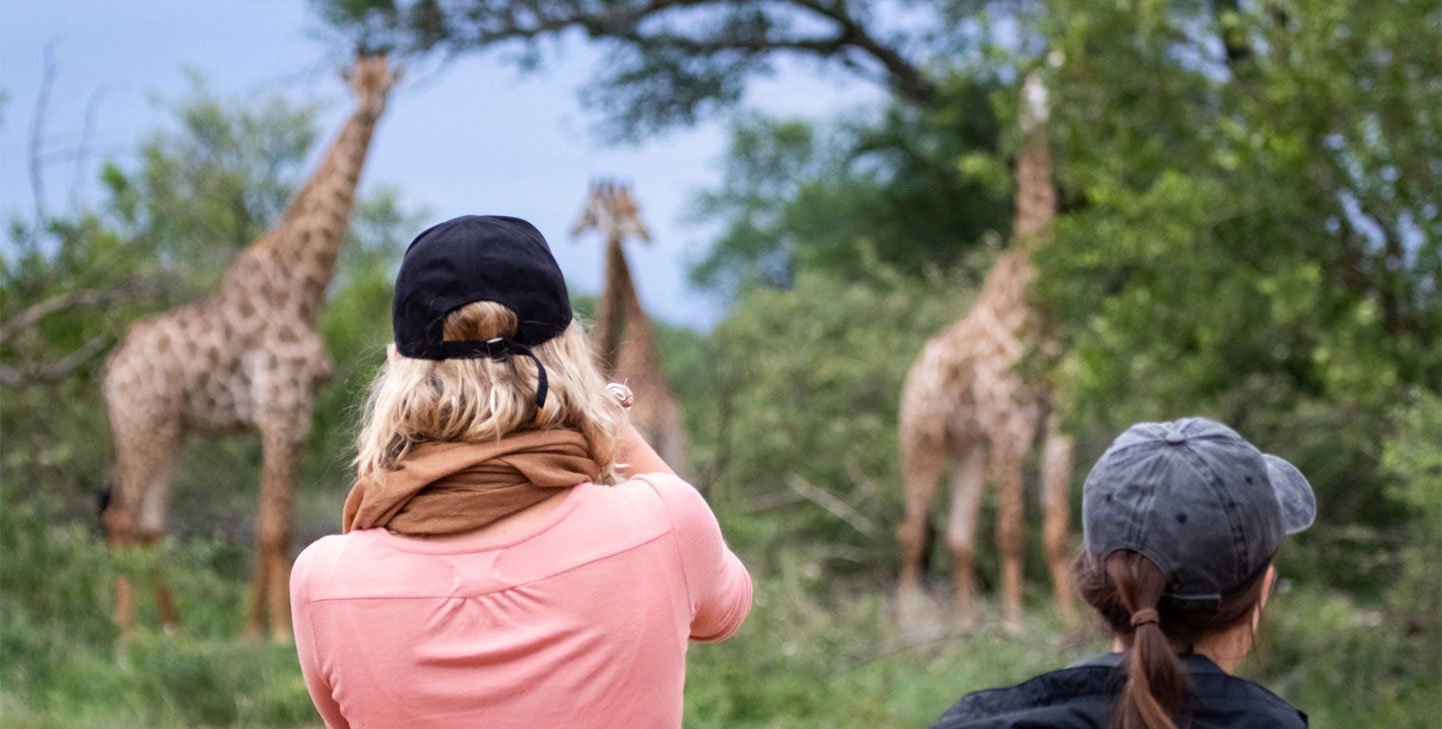

Volunteer with animals
Help protect endangered species and habitats.
Ecosystems like rainforests, tropical islands and mountainous cloud forests aren’t usually just beyond your doorstep. Here’s your chance to work on conservation projects grounded in science, help change the world ethically, and come face-to-face with some of the world’s rarest animals in remote, thrilling and beautiful habitats.
How can I volunteer to care for animals around the world?
Are you an animal lover looking to volunteer with animals abroad?
There are many different ways to volunteer to help animals around the world. Some wildlife conservation organisations offer volunteer opportunities that involve working with wildlife in their natural habitats. Other organisations offer opportunities to work with domesticated animals in shelters or sanctuaries, such as volunteering at an animal rescue centre.
At GVI, we offer you animal volunteering experiences with a difference. You’ll join cutting-edge wildlife conservation research teams on remote research stations worldwide. Here you’ll work alongside like-minded, passionate people from all over the world.
- Travel to the tropical Mexican Caribbean, Greece, Costa Rica, Mexico or coastal Thailand to help care for and rehabilitate sea turtles.
- In the Kekoldi Indigenous Reserve in Costa Rica, we offer programs with a focus on reptiles and amphibians, wild cats and birds.
- Take a trip to Northern Thailand and work with elephants who have been relieved from the tourism industry. You could also contribute to the conservation of white-handed gibbons in this mountainous region.
- On the tropical island of Nosy Be in Madagascar wildlife volunteers work in the Lokobe National Park to protect critically endangered lemurs.
- Based on a private game reserve in South Africa, you can contribute to protecting some of the world’s most vulnerable species, including big cats, elephants, rhinos and buffalos.
- Located in a remote village in Fiji, our wildlife conservation programs focus on the conservation of dolphins, turtles and sharks.
- Travel to Tenerife, part of the Spanish Canary Islands, where you’ll observe whales and dolphins in their natural habitat and contribute to their conservation.
Who can volunteer to care for animals around the world?
Our animal volunteer abroad programs are open to anyone who wants to make a difference while they travel and is interested in animal welfare and conservation. Animal care volunteers could be:
- Curious young people: Who want to get hands-on experience working with animals in a wildlife conservation setting, which can be invaluable for developing an understanding of the challenges facing wildlife and the methods used to protect them
- University graduates looking to complete an internship or professional apprenticeship where they’ll gain career-boosting skills like leadership and teamwork, valuable work experience and additional qualifications to add to their CVs.
- Students taking a gap year: Students who want to connect with professionals, gain career insights, and develop skills in teamwork, communication, and problem-solving applicable across various conservation and other career paths.
- High school groups, university groups and corporate groups who are looking for tailor-made programs that combine volunteering with cultural immersion.
- Career breakers: Anyone who wants to take a break from their current industry and travel abroad to dedicate time to animal conservation and rehabilitation.
- Older adults looking for the thrill of a lifetime: There is at least one cliche that proves true: it’s never too late. None of our volunteer programs for adults have a maximum age restriction. We have plenty of volunteering options for those over 50 – no experience or specific qualifications are needed. We provide all necessary training; the only requirements are enthusiasm, passion for making a difference and readiness for change.
- Conservation researchers: For students wanting hands-on experience in the field, our research fellowships offer access to expert training, exclusive datasets, and opportunities to publish or co-author papers, all centred around wildlife conservation.
- Teen volunteers. Tailored for those aged 15 to 17, our specially curated teen volunteer programs actively involve participants in impactful, real-life conservation projects that are as fun as they are educational!
Where can I volunteer with animals around the world?
If you’re looking to volunteer with animals abroad, GVI offers wildlife volunteer programs in the following locations:
What are the benefits of volunteering with animals?
Animal care volunteering offers a range of benefits, both for the animals you’ll be working with and for yourself. Some of the benefits include:
- Making a tangible impact on animal well-being.
- Contributing to the preservation of endangered species.
- Developing skills in teamwork, communication and problem-solving.
- Building relationships with like-minded individuals from around the world.
- Immersing yourself in a new culture and gaining a new perspective on the world.
- Having fun and making memories that will last a lifetime.
Who will be working on the animal volunteer programs?
All of our projects are led by local wildlife conservation organisations, governments or NGOs. The objectives and goals of each project are determined by these partner organisations. Some of the partners we work with include:
- Costa Rica: Kekoldi Hawkwatch and Turtle Rescue Cahuita.
- Greece: ARCHELON and Wildlife Sense.
- Fiji Locally Management Marine Area Network (FLMMA).
- Madagascar National Parks.
- Mexico: Centro Regional de Investigacion de Acuacultura y Pesquerias (CRIP) and Commision Nacional de Areas Naturales Protegidas (CONANP).
- South Africa: Karongwe Game Reserve Association, BirdLife South Africa, EarthRanger, Rhino Revolution and The Metapopulation Initiative.
- Canary Islands, Spain: REDPROMAR, CleanSwell and EOceans.
- Thailand: The Thai Royal Navy and Huay Pakoot Elephant Community Foundation.
And of course, you’ll be joined by passionate animal lovers from around the world. These people will become the friends you think of as family, and have been brought together by a shared mission and values: to contribute to wildlife conservation efforts. And to help make a positive impact in the world.
Our programs









Make the most of our unique programs with these exclusively curated local adventure and wellness experiences.








Volunteer abroad with sea turtles
We offer animal care volunteer programs focused on sea turtles in four locations:
Our project work focuses on four species of sea turtles: green sea turtles, leatherback turtles, loggerhead turtles and hawksbill sea turtles.
Get hands-on with volunteering by monitoring nests, overseeing turtle hatchlings and participating in beach cleans. Join daily surveys to identify new and returning sea turtles, measure them, and record distinctive markings. Your efforts contribute to understanding practical aspects like turtle behaviour, nesting strategies, migration patterns and hatchling success rates.
Volunteer abroad with elephants
We run two elephant conservation programs – one in Chiang Mai, Thailand and the second on a private game reserve in South Africa, an hour away from Kruger National Park.
Elephant conservation volunteering in Thailand
Leaving behind their lives in the tourism industry, these gentle giants now live a wilder life in Chiang Mai Province in Northern Thailand, an area famous for its traditional elephant-keeping communities. Observe the elephants in their natural habitat and learn about elephant history, behaviour, training, biology and social interactions directly from the people who have cared for and worked alongside these beautiful animals for centuries.
Elephant conservation volunteering in South Africa
Our wildlife conservation volunteer program in South Africa focuses on elephants, rhinos and buffalos. Located on a private reserve in Limpopo, you’ll be working with an international team on essential research. On this program you’ll engage in surveys and safari vehicle tracking, gathering crucial data on elephant population dynamics, behaviours and identification details.
Other species around the world
These are some of the incredible species found in the locations where our volunteering with animals programs take place.
- Coatis, ocelots, monkeys, sloths, sea turtles and migratory birds of prey in Costa Rica.
- Dolphins, sea turtles and sharks in Fiji.
- Black lemurs, Hawks’ sportive lemurs, panther chameleons, dwarf chameleons, dwarf frogs and the Malagasy leaf-nosed snake in Madagascar.
- Lions, cheetahs, elephants, rhinos, buffalos, hyenas, porcupines, giraffes and leopards in South Africa.
- Bryde’s whales, long-finned pilot whales, spotted Atlantic dolphins and bottlenose dolphins in Tenerife.
- White-handed Gibbons in Thailand.
Travel with us to some of the world’s most extraordinary and vulnerable habitats, where you can experience every kind of terrain – from tall jungle peaks to colourful coral reefs and every summit, shore and isle in between. We offer animal volunteer opportunities in the following locations:
Costa Rica
Experience the beauty of Costa Rica’s Kekoldi Indigenous Reserve through our wildlife volunteer programs. You’ll live and work at our Kekoldi research station, surrounded by sea turtles, jungle cats, monkeys, birds, raptors, reptiles, and more in their natural habitat.
You’ll go on hikes, conduct biodiversity surveys on key species, and monitor the reserve’s health by documenting sightings of reptiles, amphibians and other species. During the raptor season, you can participate in ongoing research aimed at deepening our understanding of the prevalence of these species.
Fiji
Joining a conservation program in Fiji means experiencing the magic of Viti Levu’s Dawasamu District. You’ll live on a remote island, close to the enchanting Moon Reef and its spinner dolphins, reef sharks, tropical fish and sea turtles. It’s a chance for incredible reef dives, marine research and embracing the laid-back village lifestyle.
This is a rare chance to live in one of Earth’s most pristine areas, actively contributing to its protection while helping safeguard ocean animals like dolphins, sharks and turtles.
Greece
We run sea turtle conservation volunteer programs in two captivating Greek locations.
First up is Giannitsochori, a picturesque traditional village nestled between the pristine waters of the Aegean Sea and the rugged expanse of the Peloponnesian coastline. Known for ancient sea turtle nesting routes, our work here plays a crucial role in preserving this coastal habitat for loggerhead and green turtles.
The second location is Kefalonia, the largest Ionian Island. Our under-18 sea turtle conservation program is based in the charming seaside town of Argostoli, situated within Kefalonia. Working in collaboration with Wildlife Sense, teen volunteers on this island work towards the protection of loggerhead and green turtles.
Madagascar
From our research station on the island of Nosy Be, we work to protect three lemur species listed on the IUCN Red List. Madagascar, off East Africa’s coast in the Indian Ocean, is home to unique wildlife like the pint-sized mouse lemur and eye-catching panther chameleon. Our wildlife conservation efforts revolve around the collection and analysis of data on indigenous reptiles, birds and mammals, with a specific focus on lemurs and chameleons.
When you’re not working, take in the serenity of the island’s pristine beaches or hike up Mont Passot for sweeping panoramic views – there’s a whole vibe waiting to be explored on this biodiverse island.
Mexico
Situated in the beautiful Mexican Caribbean, volunteers at our research station in the coastal town of Puerto Morelos will learn about the biology and ecological importance of sea turtle species, as well as gain insights into what threatens their survival. In particular, participants will assist our local partner – the National Commission for the Natural Protected Areas (CONANP) – with their sea turtle nesting and hatching monitoring programs, help in photo identification of sea turtles in the Ojo de Agua snorkelling site, and help develop and implement conservation education programs in the local community.
South Africa
Located in Limpopo, our research station promises an authentic safari experience, just a 45-minute drive from the town of Hoedspruit. The private game reserve is a haven for diverse wildlife, including elephants, rhinos, lions, giraffes, zebras, wildebeests, impalas, leopards, cheetahs, hyenas, honey badgers, baboons and numerous bird species.
As a wildlife conservation volunteer, you’ll actively contribute to critical conservation work, collaborating with local authorities and expert research teams to preserve the rich ecosystem, including large dams, rivers and a vibrant bird population.
Canary Islands, Spain
Our research station is based on the island of Tenerife, the largest of the Spanish Canary Islands. Centred around whales and dolphins, our conservation programs in Tenerife focus on assessing marine populations, contributing to conservation science, managing coastal waste, and promoting sustainable tourism practices.
Your days will be spent on boats, interacting with dolphins and whales in their natural habitat. Tenerife’s diverse landscapes, ranging from sun-kissed beaches to snow-capped peaks, provide a spectacular backdrop for your volunteer experience.
Thailand
Thailand is an abundant tropical territory home to thousands of species of mammals, fish, reptiles and insects. If you join a GVI animal care volunteer program in Thailand, one of the following locations will become your office:
- Volunteer with Asian elephants in the northern mountains of Chiang Mai, working alongside the local elephant-keeping community to re-establish elephants from the tourism industry into a natural habitat.
- Work in Phang Nga on sea turtle conservation volunteer projects alongside experts from The Thai Royal Navy.
What do animal volunteers do?
Participants on our animal volunteer programs work on wildlife conservation projects that are dedicated to the preservation of a range of animal species and their habitats. One of the most striking features of our animal care volunteer programs is that they provide a real-life demonstration of how animals, environments and human beings can – and do – interact positively within an ecosystem.
What can I expect from an animal volunteering program?
Volunteering to work with animals is an incredible opportunity to make a difference, learn new skills, and have fun while doing it. On one of GVI’s animal volunteer programs, you’ll be playing an important role in helping protect some of Earth’s most treasured species and support locally-led wildlife conservation efforts. You’ll also have the opportunity to learn about animal behaviour and conservation techniques from experts.
Is volunteering with animals ethical?
Yes. GVI has a very strict and robust ethical animal handling policy on all our animal volunteer programs and research projects, which is constantly monitored and updated. You can read more about it here.
How can I travel the world and work with animals?
Simple! GVI’s animal volunteer programs abroad make it the easiest thing in the world to simultaneously volunteer with animals in need of care and rehabilitation and travel to some of its most beautiful locations.
Is it necessary to handle wild animals on an animal volunteer program?
It’s not always essential to interact with wild animals to contribute to their conservation. But in some cases, the benefits of interacting with wild animals, under the supervision of experts, outweighs the risks. All of our international animal care volunteer programs only allow for interactions that are essential to the well-being of the animals involved.
How does GVI ensure the safety of volunteers?
If you’re working with a reputable and ethical animal care organisation you can rest assured that you’ll be taking part in work that won’t put you at risk of being injured by a wild animal. All of GVI’s local staff and partners have expertise in the field and will supervise you in a way that is safe, while still allowing you to gain valuable experience. GVI also has a strict stance on animal interaction that is applied to every animal volunteer program we run.









Make the most of our unique programs with these exclusively curated local adventure and wellness experiences.













